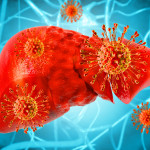A simple new liver test is raising hopes of an alternative to the pain and riskiness of biopsies for sufferers of hepatitis C—at a time when hepatitis-related liver disease is the leading cause of death for Americans with HIV. Some hep-savvy skeptics are not convinced, though, that the still-experimental machine is up to the task.
FibroScan, which measures the liver’s health with vibrations instead of scalpels, showed promise in a French study reported in the February 1 issue of The Journal of Acquired Immune Deficiency Syndromes (JAIDS). It has won over some doctors, too. “FibroScan should replace biopsies—and cause more people to get their livers tested,” predicts Douglas Dieterich, MD, a liver disease specialist at Mount Sinai School of Medicine in New York. Raymond T. Chung, MD, at Massachusetts General Hospital, and Bennet Cecil, MD, at the Hepatitis C Treatment Centers in Louisville, KY, also told POZ that approving the test for general use would get more patients into treatment.
Jules Levin, the HIV and hepatitis C coinfected founder of the National AIDS Treatment Advocacy Project, is not confident, however, that FibroScan will become the new gold standard. “Noninvasive procedures are not as reliable as liver biopsies,” he insists—at least for measuring the wide range of possible damage between full health and full-on cirrhosis.
Spotting these variations is an essential task. When hep C damages the liver—a process generally accelerated by HIV—it can cause permanent scarring, which in turn may bring on cirrhosis, bleeding, liver cancer or even organ failure. But biopsies are uncomfortable procedures that involve removing tiny slices of the liver for examination under a microscope, not to mention the risks of bleeding or organ damage. “People with hep C who also have HIV are more likely to try to avoid [biopsies] because they have already been through so much,” Dieterich points out.
FibroScan, on the other hand, simply bounces “seismic echoes” off the liver to determine how elastic it is. The patient feels nothing; it’s over in five minutes; and it can be done as often as necessary.
How to compare iffy results with the benefit of luring more hep sufferers and co-infected patients to the doctor for the care and attention they desperately need? Doctors have had few chances to look into that, as FibroScan is currently available only in Boston and Miami and each machine costs a hefty $80,000. But one of Dr. Dieterich’s patients trekked to Boston recently for the test and Dieterich says he felt no need to back up those results with a biopsy.
Tracy Swan, the coinfection project director at New York’s Treatment Action Group, contends that neither technique is completely reliable but that biopsies are currently a surer thing. “FibroScan isn’t a replacement for biopsy,” she says. “But it does give coinfected people and their clinicians more options and information. And that is a good thing.”
Advertisement
Advertisement
Advertisement





Comments
Comments